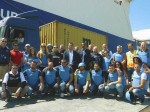At a British Pugwash discussion meeting on 13 June at University College London, Julian Borger, the Guardian’s world affairs editor, spoke on advances in drone warfare and underwater surveillance which call into question the Successor’s stealth.
Events RSS feed for this section
Climate change: can the world meet the targets agreed in Paris?
In December 2015, the nations of the world met in Paris and agreed to try to reduce greenhouse gas emissions so as to hold “the increase in average surface temperature to well below 2°C”. At this British Pugwash discussion meeting on 5 April 2016, Dr Christopher Watson presented our findings, describing the technology options and, […]

The use of chemical weapons in Syria: misleading narratives and ongoing consequences
At a British Pugwash discussion meeting on 1 July 2015, Richard Guthrie and Dr Caitriona MacLeish explored the highly contradictory themes of narratives developed about the Syrian chemical weapons programme and the international responses to it. These events had many ongoing consequences, not least the continuing use of chlorine in barrel bombs which could weaken […]

What happened to Trident?
The 11th annual Rotblat Lecture at the Hay Festival was given this year on 30 May by the distinguished journalist and broadcaster Jon Snow, who asked ‘What happened to Trident?’

Western responses to Russian activities in Ukraine
Events in Ukraine have contributed to the gravest crisis in Russia-West relations since the end of the Cold War. Dr Ian Kearns Director of the European Leadership Network, explores what has gone wrong, how the West has responded and what it should do next to both resist Russian behaviour and set relations on a more […]
UK plans for a new nuclear build: A British Pugwash view
13 November 2014, Dr Christopher Watson, UK plans for a new nuclear build: A British Pugwash view, Presentation to the European Physical Society Energy Group meeting in Lisbon 2014
